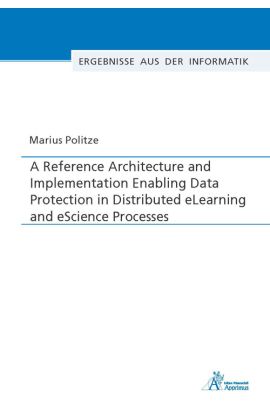Our daily life is characterized by an increasing number of process supporting IT services. With wireless and mobile networks, all kinds of devices are connected to the Internet and constantly access, collect and exchange data with various IT services to instantly provide information. The increasing volume and heterogeneity of computer devices requires changes in the architecture of IT services. At universities, students, researchers and decentralized service providers operate and work with such a heterogeneous and distributed IT service landscape. Existing monolithic process supporting systems are often highly specialized in locally defined processes and cover isolated business cases. If interfaces are available, they often use specific vocabularies and focus on technical details of the system, not the supported processes. Users, however, work in environments spanning across processes and often combine central and decentral IT services to achieve their goals. As digital competence is increasing, users seek to individualize and extend services according to their current needs. This extended degree of individualization requires a comprehensive digital service infrastructure.
To close the gap between the user's perception of processes and the provided interfaces, this thesis proposes and evaluates a process-aware and service oriented reference architecture. By gradually hiding the technical complexity of back end systems, it introduces technical and semantic consistency across process and system boundaries. Taking into account the varying organizational, development and governance processes across back end systems, a web service landscape is implemented that uses technologies like HTTP, REST and the OAuth2 workflow to ensure consistency and compatibility with users' environments. Adaptations of the OAuth2 workflow allow to cross boundaries of monolithic systems and integration into the landscape. Tiers of abstraction allow reuse of services by their technical specification or semantic modeling. Within various case studies from different areas of the university, the implementation is validated in real world scenarios. Semantic consistency allow users to adapt processes crossing system boundaries to their own needs. Technical consistency and focus on standardized technologies does not require technical knowledge of back end systems and enables individualized implementations in decentralized computing environments.
| Autor | Politze, Marius |
|---|---|
| Lieferzeit | 3-4 Tage |
| Gewicht | 0.382 kg |
| Erscheinungsdatum | 11.12.2019 |
Dissertationen
A Reference Architecture and Implementation Enabling Data Protection in Distributed eLearning and eScience Processes
Kurzbeschreibung
Increasing volume and heterogeneity of computer devices require changing existing, highly specialized IT services. Users, however, want to combine and individualize services to achieve their business goals. By gradually hiding the technical complexity of systems, this thesis proposes a process-aware reference architecture to connect services and users' expectations that is validated using case studies from different areas of the university.

